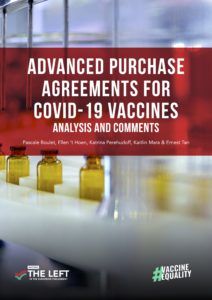Advanced Purchase Agreements (APAs) were part of a strategy to provide upfront financing for Covid-19 vaccines and to accelerate their development and availability. Since the beginning of the pandemic, governments have spent at least €93 billion on COVID-19 vaccines and therapeutics globally.
It is the correct public policy response to use public financing to ensure pandemic products are developed rapidly and become available equitably. APAs can help do this by de-risking company investments in an often-costly research and development process, through upfront payments to speed R&D and through the promise to purchase products when they come to market.
At the beginning of the pandemic, European leaders promised that the Covid-19 vaccines would be global public goods – that is, they would benefit all. “None of us will be safe until everyone is safe,” said European Commission President Ursula von der Leyen. The promotion of Covid-19 vaccines as a global public good as a ‘negotiating directive’ was included in the agreement between the Commission and the EU Member States, which is attached to some of the APAs.
A new analysis by Medicines Law & Policy, commissioned by The Left from the European Parliament, examines the texts of several APAs to determine, to the extent possible, if the conditions in the contracts themselves are likely to ensure that this public goods goal is met.
The study can be accessed here, or by clicking the image below.
Medicines Law & Policy brings together legal and policy experts in the field of access to medicines, international law, and public health. We provide policy and legal analysis, best practice models and other information that can be used by governments, non-governmental organisations, product development initiatives, funding agencies, UN agencies and others working to ensure the availability of effective, safe and affordable medicines for all.
